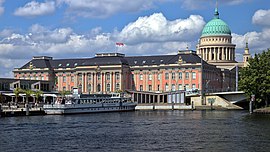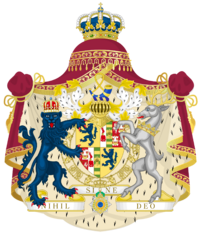Augusthal
This article is incomplete because it is pending further input from participants, or it is a work-in-progress by one author. Please comment on this article's talk page to share your input, comments and questions. Note: To contribute to this article, you may need to seek help from the author(s) of this page. |
Augusthal | |
|---|---|
Clockwise from top: City center and St Benedict's Church, New Town Hall, Lucas Palace in the Palaisgarten, New Palace and the Holy Church, Alter Kammerwerder, Fahnicht Gate | |
Location within Mascylla | |
| Country | |
| State | Aldia |
| Government | |
| • Mayor | Marion Noack (SDP) |
| Area | |
| • City | 509.9 km2 (196.9 sq mi) |
| Elevation | 208 m (682 ft) |
| Population (2018) | |
| • City | 1,789,426 |
| • Density | 3,509.4/km2 (9,089/sq mi) |
| • Metro | 11,904,475 (Elbgau–Blaugold region) |
| Time zone | UTC+02:00 (EST) |
| • Summer (DST) | UTC+03:00 (ESST) |
| Postal code | 03-08 |
| Area code(s) | 444, 726 |
| Vehicle registration | A |
| Website | www.augusthal.ma |
Augusthal (Hesurian: [ˈaʊ̯gʊsta:l]; Albian Hesurian: Ougosdal; Cuthish: X) is the capital and largest city of the Mascyllary state of Aldia with a population of 1,789,426 inhabitants in 2018. It is the single largest city in Northern Mascylla as well as the fourth-largest city in Mascylla after Flussmund, Königsreh, and Lancaide. Augusthal is situated at the confluence of the minor tributary river Augus into the Elbgau, in the North Mascyllary Plain, amid a hilly landscape dominated by moraines and a large number of lakes. It is both the largest city and center of the Elbgau–Blaugold region (Elbgau-Blaugold-Gebiet), the largest polycentric metropolitan area and conurbation in Mascylla, situated in the Aldian Bight and home to some 11.9 million people.
The city was the primary and official residence of the Aldian and later Mascyllary kings from 1647 until 1793, and remained the secondary seat of the Mascyllary monarchy even after the capital was moved to Lancaide and later Königsreh; before that, it served as the capital city of the Duchy of Aldia (1207–1297) and the Kingdom of Aldia–Fania (1297–1647). The city is dominated by numerous royal gardens, parks, and palaces (including the New Palace, Lucas Palace, Belleau Palace, and Theresienhof Palace), though it suffered heavy to near total destruction during the Great War (1911–1916).
Augusthal's central position in the densely populated and highly urban Elbgau–Blaugold region makes it the central transport hub in eastern Mascylla. Augusthal International Airport is Mascylla's fourth-busiest international airport in 2018, numerous motorways (Autobahnen) intersect to the immediate south, and the Augusthal Hauptbahnhof is among the largest Berean main railway stations by floor area.
Rising to economic prominence in the late 19th century, Augusthal has emerged as a primary center of Mascyllary science and higher education; the Eduard Lobrecht University of Augusthal (including the University Hospital, the largest hospital complex in Mascylla), the Royal University of Applied Sciences (Königliche Fachhochschule), the Augusthal Medical School (Medizinische Hochschule Augusthal), the Royal Academy of the Arts (Königliche Kunstakademie), and an additional 22 research institutes. The Augusthal Fair (Messe Augusthal) is the sixth-largest trade fair in the world, and the city is a leading driver of mobility, transport, and electronics innovation. The Newcott World Cities Index classifies it as a Contributor global city. Augusthal is widely known for the annual Aldian Carnival celebrations, attracting hundreds of thousands of tourists, as well as the Wietzenfest, the Grüner Picknick, and the delicacy Augusthaler Kranz.









